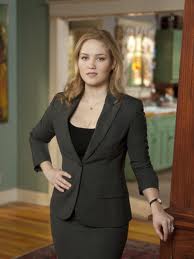The Other Dramatic Transformation of NBC’s “Up All Night”
 It has been a really hard fall for a feminist TV lover. At least, for this feminist TV lover.
It has been a really hard fall for a feminist TV lover. At least, for this feminist TV lover.
When attorney-on-the-partner-track Julia Braverman-Graham of Parenthood quit her job, I was upset, but patient. Having adopted a 10-year-old boy, Julia found her demanding job did not allow her to mother the lonely boy as she felt necessary. As the weeks have passed, however, and as Julia has had zero reaction to quitting the legal career she spent years building, I’ve begun to wonder where this storyline is headed.  So far, it is headed nowhere, at least in terms of a broader commentary on the difficulty of balancing home and family. I continue to wait because the show enjoyed only a short season and because I have confidence in Parenthood in the long run.
But Julia was the least of my problems.
 Mindy Kaling brought her new show to Fox last fall, and I have been continually stymied by her odd embrace of a retrograde romantic ideal. Continually privileging an exploration of Kaling’s character’s personality quirks over her professional struggles as an OB-GYN, The Mindy Project often defies its audience to connect with the character. More problematic is the program’s broader gender politics. In one episode, for example, Mindy “won” a battle of the sexes by forcing her co-worker to give her a breast exam. In another episode, Dr. Mindy stormed into the office of two (male) midwives, accused them of being amateurs, forced them to call their patients “clients,” and reminded all pregnant women in the office that unless they were 22 and thin, they likely would have complications in labor requiring the assistance of a real MD. I simply can’t figure out what I should do with this program’s seemingly illiberal representations (and neither can Alyssa Rosenberg at Think Progress).
Mindy Kaling brought her new show to Fox last fall, and I have been continually stymied by her odd embrace of a retrograde romantic ideal. Continually privileging an exploration of Kaling’s character’s personality quirks over her professional struggles as an OB-GYN, The Mindy Project often defies its audience to connect with the character. More problematic is the program’s broader gender politics. In one episode, for example, Mindy “won” a battle of the sexes by forcing her co-worker to give her a breast exam. In another episode, Dr. Mindy stormed into the office of two (male) midwives, accused them of being amateurs, forced them to call their patients “clients,” and reminded all pregnant women in the office that unless they were 22 and thin, they likely would have complications in labor requiring the assistance of a real MD. I simply can’t figure out what I should do with this program’s seemingly illiberal representations (and neither can Alyssa Rosenberg at Think Progress).
 But nothing—nothing—has exceeded my disappointment more than the transformation of Up All Night. No, I’m not referring to its forthcoming transformation from single- to multi-camera; instead, I want to discuss its two (dramatic) upheavals prior to this forthcoming change. I started watching Up All Night because its premise featured a female television producer, Reagan, returning to work after the birth of her first child, while her lawyer husband, Chris, quit his job to stay home with the baby. A central tension of the show was Reagan’s struggles as a working mother–she struggled not so much with her decision to work but rather with the fact that her husband was developing a unique bond with the baby.  Up All Night‘s subversion of the typical expectation that a mother’s love predominates fascinated me, and it made for bold television.[1]
But nothing—nothing—has exceeded my disappointment more than the transformation of Up All Night. No, I’m not referring to its forthcoming transformation from single- to multi-camera; instead, I want to discuss its two (dramatic) upheavals prior to this forthcoming change. I started watching Up All Night because its premise featured a female television producer, Reagan, returning to work after the birth of her first child, while her lawyer husband, Chris, quit his job to stay home with the baby. A central tension of the show was Reagan’s struggles as a working mother–she struggled not so much with her decision to work but rather with the fact that her husband was developing a unique bond with the baby.  Up All Night‘s subversion of the typical expectation that a mother’s love predominates fascinated me, and it made for bold television.[1]
Half way into the first season, Up All Night‘s conceit dramatically altered. Reagan learned that the talk show she produced had been purchased by a new (female) boss. For a brief moment, it seemed an even more powerful woman had arrived on set to inspire talk show host Ava and producer Reagan to new professional heights. This, however, was a red herring, as the female boss immediately left town and left in charge a male show runner. His relationship with Ava and Reagan was immediately adversarial and contentious.  This shift—in plot and tone—was dramatic. It detracted not only from the focus on Reagan and her husband, but it also suggested that the female power dynamic of Reagan and her partner Ava required the insertion of a male antagonist for proper drama.
This change, too, was short lived, for in the second season of Up All Night, Ava and Reagan’s talk show was canceled entirely. So long, every single character involved with the talk show. So long, Reagan as mother working outside the home. Now, Chris is starting a new business, while Reagan is developing a new life as a stay-at-home mother.[2] I do not begrudge a new program struggling to find its way, but I absolutely question the political shifts evident in this ratings-challenged series—a suggestion that network executives worry Americans prefer a traditional division of gendered labor on their TV.
Of course, I may be overreacting, and these are only three programs among many. Yet between Mindy’s odd conservatism and the rejection of a balanced life of work and home by Reagan and Parenthood’s Julia, I’m wondering where a feminist can go on network television to find a satisfying depiction of the genuine struggles of contemporary women who work, who mother, who partner, and who develop individual goals, dreams, and values.
[2] I should also note that this storytelling choice has reeked of privilege, as the characters have suffered no seeming financial anxiety or duress.



Thank you so much for writing about the changes in Up All Night. I know a lot of people didn’t watch it to begin with but I really enjoyed a lot of S1 but S2 has been hugely disappointing. I could have handled the Ava show being axed if Reagan and Ava then went about creating a new show but instead sticking them both at home just completely didn’t work.